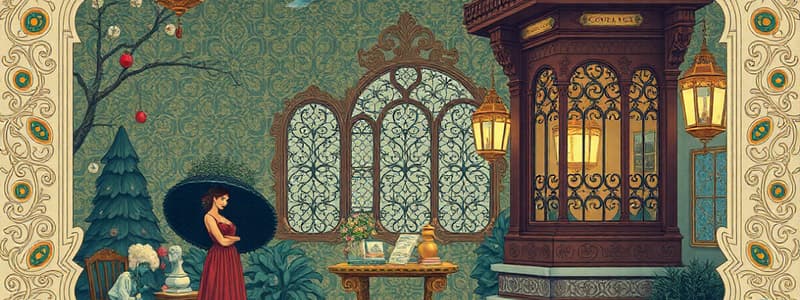Podcast
Questions and Answers
What is the thesis's central argument?
What is the thesis's central argument?
The thesis argues that the literary clerk, initially viewed as a nonentity, became emblematic of urban modernity by the early twentieth century, uniting the middle and high brows. It challenges our understanding of modernist fiction by focusing on middlebrow texts that explore the 'clerkly' experiences of office work, suburban living, and the act of rambling as a way to escape the confines of societal expectations.
What is the key to understanding the clerk's identity?
What is the key to understanding the clerk's identity?
The clerk's identity is shaped by the spaces he inhabits, such as the office, the suburb, and the ramble. Each of these spaces provides opportunities for him to challenge societal expectations and explore his individuality.
The thesis argues that the clerical class is a symbol of the nation's economic and social structure.
The thesis argues that the clerical class is a symbol of the nation's economic and social structure.
True (A)
What is the author's main argument regarding the role of the clerk in middlebrow fiction?
What is the author's main argument regarding the role of the clerk in middlebrow fiction?
According to the author, what is the most significant aspect of the clerk’s experience?
According to the author, what is the most significant aspect of the clerk’s experience?
Why does the author not extensively discuss the impact of World War I and World War II on the clerical experience?
Why does the author not extensively discuss the impact of World War I and World War II on the clerical experience?
Flashcards
The Literary Clerk
The Literary Clerk
A literary character representing the lower-middle-class worker, often associated with offices and urban modernity.
Topographical Study
Topographical Study
A study that focuses on the spaces and places associated with a specific subject or theme.
Suburbanization
Suburbanization
The movement of populations from cities to suburbs, particularly during the 19th century.
Modernity
Modernity
Signup and view all the flashcards
Middlebrow Fiction
Middlebrow Fiction
Signup and view all the flashcards
Classical Realism
Classical Realism
Signup and view all the flashcards
Literary History
Literary History
Signup and view all the flashcards
Subculture
Subculture
Signup and view all the flashcards
Cultural Capital
Cultural Capital
Signup and view all the flashcards
Clerkly Stereotype
Clerkly Stereotype
Signup and view all the flashcards
Personal Experience
Personal Experience
Signup and view all the flashcards
Clerical Masculinity
Clerical Masculinity
Signup and view all the flashcards
Bookshelves in Fiction
Bookshelves in Fiction
Signup and view all the flashcards
Readership Analysis
Readership Analysis
Signup and view all the flashcards
Modernism
Modernism
Signup and view all the flashcards
Everyday Life
Everyday Life
Signup and view all the flashcards
Escape Narrative
Escape Narrative
Signup and view all the flashcards
Everyman
Everyman
Signup and view all the flashcards
Ramble Narrative
Ramble Narrative
Signup and view all the flashcards
Escape
Escape
Signup and view all the flashcards
Clerkly Culture
Clerkly Culture
Signup and view all the flashcards
Despair
Despair
Signup and view all the flashcards
Narrative of Inactivity
Narrative of Inactivity
Signup and view all the flashcards
Modernism
Modernism
Signup and view all the flashcards
Hegemony
Hegemony
Signup and view all the flashcards
Nation as a Metaphor
Nation as a Metaphor
Signup and view all the flashcards
Satire
Satire
Signup and view all the flashcards
Relatability
Relatability
Signup and view all the flashcards
Subversion
Subversion
Signup and view all the flashcards
Mirroring of Reality
Mirroring of Reality
Signup and view all the flashcards
Character Construction
Character Construction
Signup and view all the flashcards
Textual Analysis
Textual Analysis
Signup and view all the flashcards
Study Notes
Thesis Title and Author
- Title: 'WHAT THOUGHT OF 'HEAD OFFICE' TO "ONE OFF HIS HEAD"": ESCAPING 'CLERKLY' LIVES' IN MIDDLEBROW FICTION (1859-1945)
- Author: Nicola Jane Bishop, B.A., M.A. (Lancaster University)
Thesis Summary/Abstract
- Thesis explores the literary clerk's transition from a mundane figure to an 'Everyman' figure emblematic of urban modernity in early 20th century.
- Analyzes texts from the middlebrow genre: Victor Canning, Norman Collins, Keble Howard, and others.
- These authors often highlight the clerk's struggle and hardship within the office.
- The thesis examines 'escapes' portrayed: subversion of office time, the pleasures of suburbs, and the ramble as an adventure.
- Shows how these clerical narratives explored wider anxieties of 19th/20th century modernity.
- Investigates how clerks became emblematic of 'ordinary' modernity in the early 20th century.
Theses Chapters
- Introduction
- Chapter One: The Office
- Chapter Two: The Suburbs
- Chapter Three: The Ramble
- Conclusion: Everyman a Clerk
- Bibliography
Studying That Suits You
Use AI to generate personalized quizzes and flashcards to suit your learning preferences.
Related Documents
Description
This thesis examines the evolution of the clerk in middlebrow fiction, illustrating how this figure transforms into a symbol of urban modernity from 1859 to 1945. It analyzes various texts and themes such as office life, suburban pleasures, and adventures that reflect broader societal anxieties of the period. The study uncovers the significance of the clerk as an Everyman in early 20th-century narratives.
